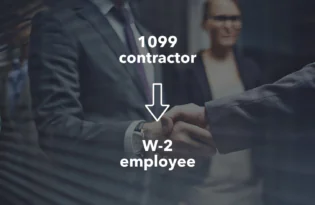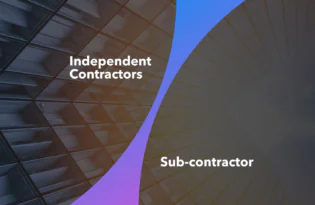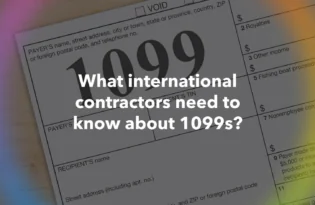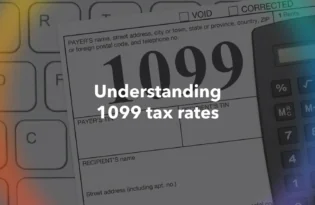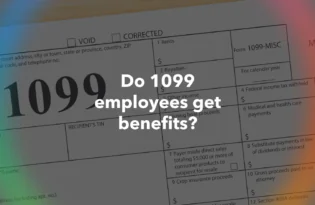A guide to filing 1099 for foreign contractors
A comprehensive guide to filing 1099 for foreign contractors, types of 1099 forms, and other alternative forms for hiring foreign contractors
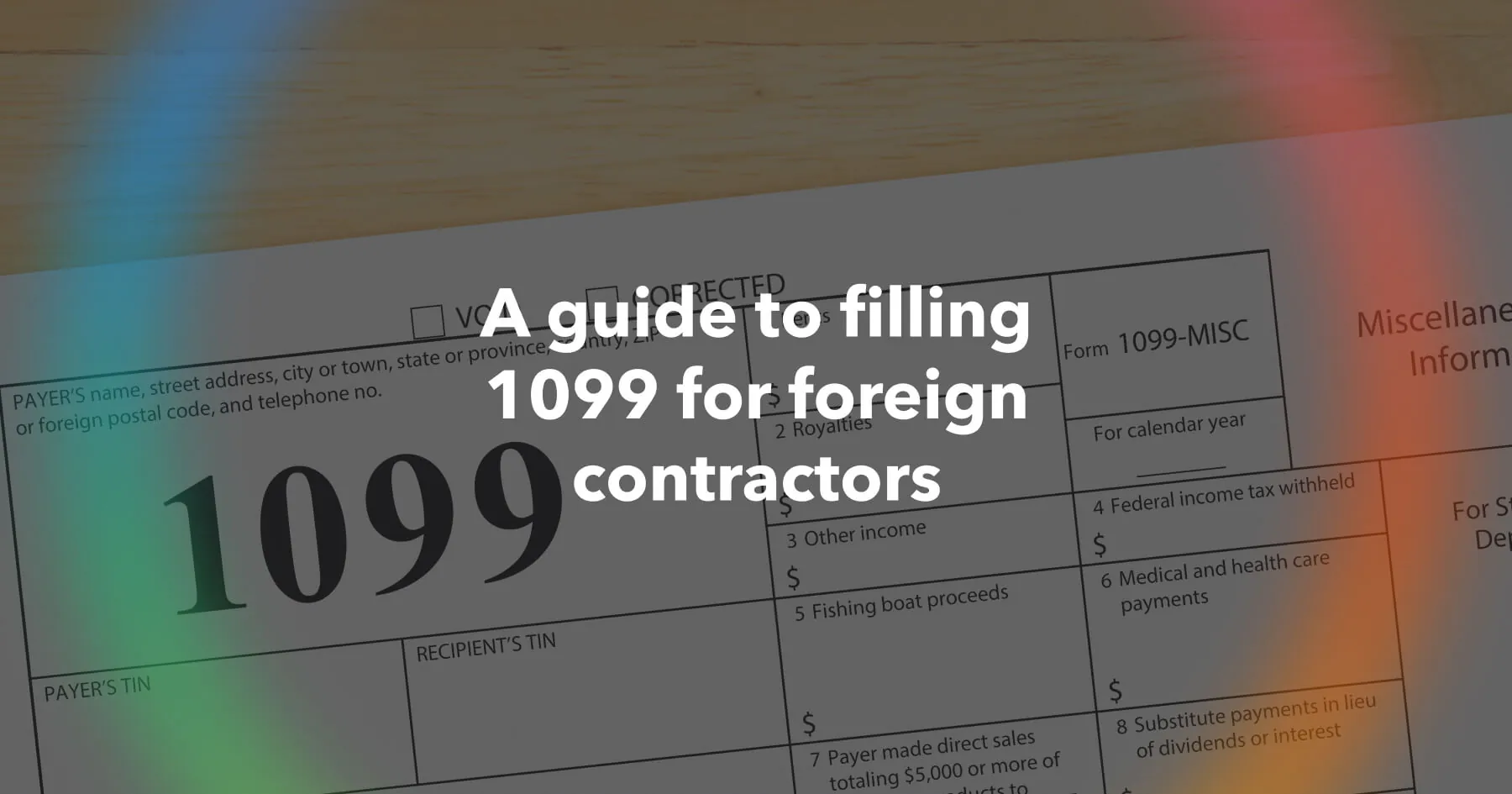
The era of globalization requires employers to expand their workforce internationally. US employers are continually seeking to hire foreign contractors to diversify their businesses and expand internationally..
This guide is an explainer on filing 1099 for foreign contractors, the requirements for foreign contractors for employers in the US, explaining the situations where filing a 1099 for foreign contractors is required or where other forms, such as W-8BEN, might be needed. It will also elaborate on how US employers can manage and pay international contractors.
What is Form 1099?
Form 1099 is one of several IRS tax forms that are used to report payments to independent contractors. This has led to the coinage of phrases such as ‘1099 workers’.
It is worth noting that not all international contractors are 1099 workers. As ‘1099’ is the tax code for the form that reports payments to all US-based contractors, US employers often associate 1099 with all contractors.
When do you have to file Form 1099 for foreign contractors?
If you hire independent contractors, you may be required to file Form 1099-NEC to report what you’ve paid them. The IRS has specific criteria for when a payment qualifies as non-employee compensation:
- The individual or entity you paid isn’t your employee.
- The services were performed as part of your business operations (this includes payments by nonprofits and government entities).
- The recipient is an individual, partnership, estate, or, in some cases, a corporation.
- The total payments made to them during the year equal or exceed $600.
What are the types of 1099 forms?
There are various types of 1099 forms available, depending on the type of income earned by the contractor during the year.
US employers have to be careful in filing the proper type of Form 1099 for foreign contractors that they have hired.
The types of 1099 forms available are:
- 1099-INT: Issued by banks, credit unions, or brokerage firms, the 1099-INT reports interest income earned over $10 in a calendar year. It typically includes interest from savings accounts, CDs, and other interest-bearing assets.
- 1099-K: The 1099-K is provided by third-party payment processors and online platforms to report gross payments received for goods or services. It applies to sellers, freelancers, and gig workers who receive payments via these platforms.
- 1099-DIV: Sent to investors who earned dividends during the tax year, the 1099-DIV reports both cash and non-cash dividend distributions. It also includes information on capital gains distributions and qualified dividends from corporate stock holdings.
- 1099-G: This form is sent by government agencies to report income like unemployment benefits, state tax refunds, or other payments made by federal, state, or local governments to individuals during the tax year.
- 1099-R: Used to report distributions from retirement accounts, pensions, IRAs, or annuities, the 1099-R details the amount withdrawn, tax withheld, and the type of distribution received during the year.
- 1099-B: Issued by brokers or barter exchanges, the 1099-B reports proceeds from the sale or exchange of stocks, mutual funds, bonds, or other securities. It typically includes cost basis and gain/loss information for tax reporting.
- 1099-S: Used to report proceeds from real estate transactions, the 1099-S covers the sale or exchange of property, including residential, commercial, and industrial buildings, as well as land.
- 1099-SA: This form is issued to individuals who receive distributions from health-related savings accounts, such as Health Savings Accounts (HSAs), Medical Savings Accounts (MSAs), or Medicare Advantage MSAs.
- 1099-MISC: The 1099-MISC covers miscellaneous income not reported elsewhere, such as prize winnings, legal settlements, rent payments, or royalties. It is often used for non-wage earnings outside traditional employment or contracting.
- 1099-PATR: Sent by cooperatives, the 1099-PATR reports patronage dividends, refunds, or allocations paid to members. It is most commonly associated with agricultural or rural cooperatives, as well as farm-related businesses.
- 1099-NEC: This form is used specifically to report non-employee compensation of $600 or more. Businesses issue a 1099-NEC to independent contractors, freelancers, or self-employed professionals for services rendered.
When to use the W-8BEN for hiring foreign contractors?
The W-8 forms are completed by foreign individuals or businesses to verify their country of residence for tax purposes. This is used to certify that these individuals qualify for a reduced rate of tax withholding.
US employers often only file a 1099 for foreign contractors; however, in cases where the contractor is a non-resident alien who has worked in the US or for a US-based employer, a W-8BEN must be filed by the individual. The W-8BEN typically applies to foreign individuals who receive payments or compensation from sources in the US.
How Payoneer Workforce Management helps US employers manage and pay talent
Payoneer Workforce Management offers US employers ease of access and streamlines the onboarding process for foreign talent. Payoneer Workforce Management helps employers engage talent in over 160+ countries without setting up a local legal entity.
- Our Employer of Record (EOR) services help streamline the process for global employees.
- Agent of Record (AOR) onboarding contractors and mitigating misclassification risks..
- Contractor management tools for paying contractors in 70 currencies
Book a demo with us today.
Frequently asked questions (FAQs)
To file for non-employee compensation, one must use Form 1099-NEC. The 1099-NEC is filed when payments of at least 600$ have been made to the contractor throughout the year.
If the foreign contractor does not have American citizenship, the Form W-8BEN must be used to document the transactions they receive as payment from their employers.
Payoneer Workforce Management’s contractor management tools can help pay independent contractors in 70 currencies.
Related resources
Latest articles
-
Employment laws in Sweden
Explore the employment laws in Sweden, a comprehensive guide to employees’ rights, employer obligations, and fair labor practices.
-
Employment laws in Poland
Explore the ins and outs of employment laws in Poland, an info-rich guide to employees’ rights, employer obligations, and fair labor practices that shape the future.
-
Employment laws in Indonesia
Find out more about Indonesia labor laws that dictate how employees should be contracted, managed, and paid, both on a national and state/territory level.
-
Employment laws in France
Learn about France’s labor laws dictating minimum wage, benefits, and more. Plus, discover the consequences of non-compliance with employment laws in France.
-
Employment laws in Spain
Find out more about Spain’s labor laws, from contracts and benefits to termination rules.
-
Employment laws in Australia
Find out more about the employment laws in Australia that dictate how employees should be contracted, managed, and paid, both on a national and state/territory level.
Disclaimer
The information in this article/on this page is intended for marketing and informational purposes only and does not constitute legal, financial, tax, or professional advice in any context. Payoneer and Payoneer Workforce Management are not liable for the accuracy, completeness or reliability of the information provided herein. Any opinions expressed are those of the individual author and may not reflect the views of Payoneer or Payoneer Workforce Management. All representations and warranties regarding the information presented are disclaimed. The information in this article/on this page reflects the details available at the time of publication. For the most up-to-date information, please consult a Payoneer and/or Payoneer Workforce Management representative or account executive.
Availability of cards and other products is subject to customer’s eligibility. Not all products are available in all jurisdictions in the same manner. Nothing herein should be understood as solicitation outside the jurisdiction where Payoneer Inc. or its affiliates is licensed to engage in payment services, unless permitted by applicable laws. Depending on or your eligibility, you may be offered the Corporate Purchasing Mastercard, issued by First Century Bank, N.A., under a license by Mastercard® and provided to you by Payoneer Inc., or the Payoneer Business Premium Debit Mastercard®, issued and provided from Ireland by Payoneer Europe Limited under a license by Mastercard®.
Skuad Pte Limited (a Payoneer group company) and its affiliates & subsidiaries provide EoR, AoR, and contractor management services.


